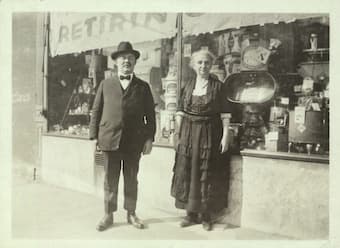
Harris and Sarah Copland
Harris Morris Kaplan grew up in Lithuania, and before immigrating to the United States he lived in Scotland for a couple of years. It was in Scotland that he changed his family name “Kaplan” to “Copland.” He had no particular musical interest, but his wife Sarah Mittenthal Copland was musically active. Their son Aaron Copland (1900-1990) was born in New York City, and he grew up in the Washington Avenue neighborhood of Brooklyn.
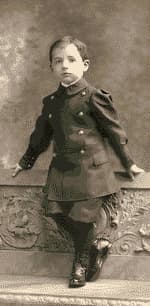
Aaron Copland as a child
Aaron was close to his older brother Ralph, and especially devoted to his sister Laurine who gave him his first piano lessons. The family was active in Congregation Baith Israel Anshei Emes, and his early exposure to music “was at Jewish weddings and ceremonies, and occasional family musicales.” Aaron started to write songs at the age of eight, and his “earliest notated music was for an opera scenario he created and called “Zenatello.” He took piano lessons with Leopold Wolfsohn for four years, and first performed publically at a Wanamaker recital”.
Aaron Copland: 2 Pieces (version for string orchestra) (London Symphony Orchestra; Aaron Copland, cond.)
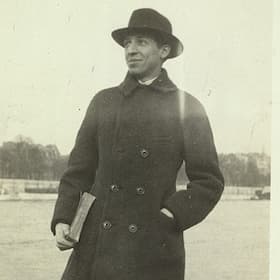
Aaron Copland, Paris, 1920s
In 1915, Aaron attended a concert featuring the Polish pianist-composer Ignacy Paderewski. Young Copland, as well as countless young hopefuls around the world, was spellbound. He immediately decided to become a composer and enrolled in a number of music correspondence courses. To further his musical education he received private instruction in theory and composition from Rubin Goldmark. The grandson of a Hungarian cantor, and nephew of the prominent Viennese composer Karl Goldmark, Rubin had studied with Antonin Dvořák at the National Conservatory in New York. Essentially, Rubin Goldmark was considered one of New York’s most eminent composition teachers. Copland held Goldmark in high esteem, even though he had “little if any sympathy for the advanced musical idioms of the day.” His list of approved composers ended with Richard Strauss. Regardless, Copland received a solid musical foundation and he later wrote, “This was a stroke of luck for me. I was spared the floundering that so many musicians have suffered through incompetent teaching.”
Aaron Copland: Piano Sonata in G Major (Ramon Salvatore, piano)
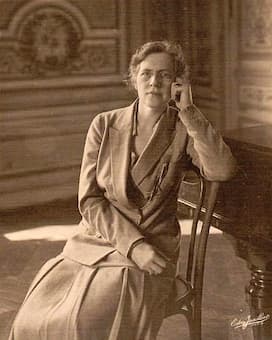
Nadia Boulanger
Copland’s graduation piece for Goldmark was the three-movement Piano Sonata in G major. Scored in the grand Romantic style, the composition demonstrates familiarity with and mastery of traditional form and harmony. However, Copland was eager to move forward and to gain knowledge of contemporary European musical styles. As such, he packed his bags and sailed to Paris in order to study music composition at the Palais de Fontainebleau. Initially he took lessons from the famed pianist Isidor Philipp, but soon consulted the legendary Nadia Boulanger for instructions in composition. He wasn’t particularly thrilled to be “studying with a woman,” but quickly found that “this intellectual Amazon was not only familiar with all music from Bach to Stravinsky, but is prepared for anything worse in the way of dissonance.” As he later wrote, “I shall count our meeting the most important of my musical life. Whatever I have accomplished is intimately associated in my mind with those early years, and with what you have since been as inspiration and example.”
Aaron Copland: 4 Motets (Gloriae Dei Cantores; Elizabeth C. Patterson, cond.)
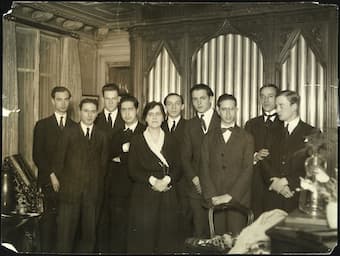
Nadia Boulanger and her class, 1923
There can be no doubt that Paris and the individuals he encountered had an enormous impact on his life and his further career. Copland found his feet as a composer in Paris, as he excitedly reported to his parents on 27 September 1921. “…I must tell you the most interesting news of all. At the Fontainebleau concert, the theatre with its 3 balconies was packed full. During the first part of the program I played one of my pieces for piano called “The Cat and the Mouse,” which I had written in Brooklyn over a year ago. It had an immense success. During the intermission M. Durand, the music publisher, came to me and asked me if that piece was published. When I told him no, he said he would publish it!!! Let me try to calmly explain you what this means… To finally see my music printed means more to me than any debut in Carnegie Hall ever could… Don’t expect me to make any fortunes out of my compositions.” At the end of his letter Copland proudly proclaims, “So, we have a composer in the Copland family, it seems.”
For more of the best in classical music, sign up to our E-Newsletter
Aaron Copland: Humoristic Scherzo “The Cat and the Mouse” (Mark Anderson, piano)

I am fortunate to have listened to this composer when I was a child in Sympathy Hall Boston. My aunt Elizabeth Smith was a social worker at BOSTON City Hospital
She received free tickets and I accompanied her any chance I could and have a love ❤️ of classical music still. Was Mr Copland’s brother a Doctor at the Hospital